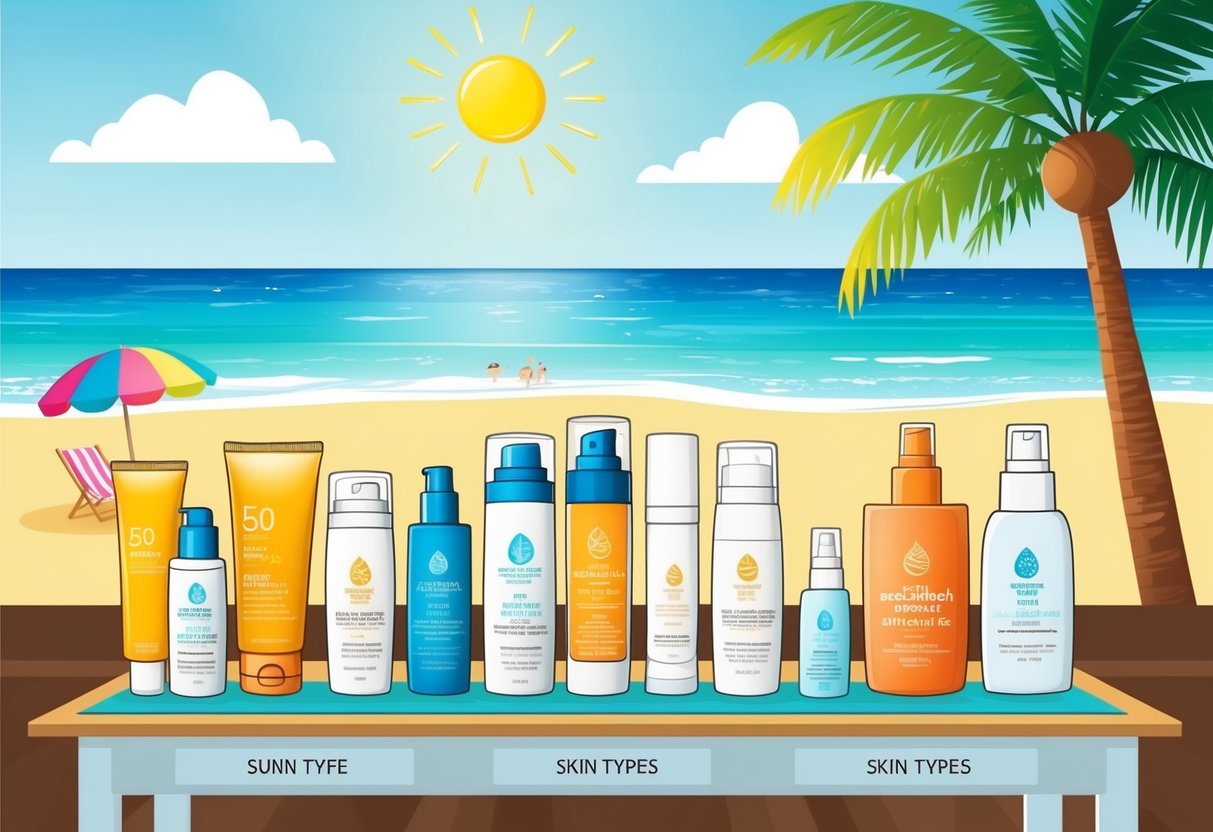How to Get Clear Skin Fast: Expert-Recommended Beauty Routines for Every Skin Type
Sun Protection and SPF Strategies

Consistent sun protection is a critical step in any clear skin routine. UV rays are a leading cause of sun damage and premature signs of aging, so using the right sunscreen and applying it properly can make a significant difference in skin health.
Choosing and Applying Sunscreen
Selecting an effective sunscreen is essential for sun protection and clear skin. Dermatologists recommend using a broad-spectrum sunscreen with an SPF of at least 30 to shield skin against both UVA and UVB rays.
Broad-spectrum products defend against burning, visible aging, and long-term sun damage. Water-resistant formulas are ideal for outdoor activities or sweaty workouts.
For daily wear, lightweight, non-comedogenic sunscreens prevent pore clogging and work well under makeup. Reapply every two hours when outdoors, and remember specific areas such as the ears, neck, and hands that are often forgotten.
Key tips for effective sunscreen use:
- Apply sunscreen even on cloudy days.
- Use about a nickel-sized amount for the face.
- Apply 15 minutes before going outside.
- Wash off sunscreen residue each night using a gentle cleanser to avoid breakouts.
Learn more about best SPF practices and product choice from this SPF skincare routine guide.
Preventing Sun Damage and Premature Aging
Long-term exposure to UV rays leads to visible skin aging, including wrinkles, dark spots, and loss of elasticity. Implementing a daily suncare routine slows the aging process and maintains skin clarity.
Sunscreen is considered the most effective anti-aging product by many dermatologists, as it helps prevent fine lines and hyperpigmentation. Wearing protective clothing, wide-brimmed hats, and sunglasses adds an extra layer of defense against UV rays.
In addition to sunscreen, habits like seeking shade during peak sun hours (10 a.m. to 4 p.m.) and moisturizing afterward support healthy, resilient skin. Crucial sun protection strategies, such as daily SPF application, truly make a difference in reducing sun damage and keeping skin youthful.
Expert Tips for Youthful, Healthy Skin
Maintaining youthful skin and minimizing visible signs of aging requires a combination of targeted skincare habits and proven dermatological strategies. Consistency with daily routines and informed choices about products can make a significant difference in skin health and appearance.
Combatting Fine Lines and Wrinkles
Fine lines and wrinkles are early signs of aging that develop due to sun exposure, decreased collagen, and natural skin aging. Sunscreen remains one of the most effective defenses, helping shield the skin from damage that accelerates wrinkles.
Dermatologists consistently recommend applying broad-spectrum SPF 30+ sunscreen daily, even on cloudy days or when indoors near windows, to slow down the aging process and support healthier-looking skin. Daily cleansing helps remove impurities and reduces irritation that can make lines more noticeable.
A gentle moisturizer applied after washing can keep skin hydrated, preventing the accentuation of dry fine lines. Retinoids, vitamin C serums, and peptides are also popular ingredients, as they support collagen production and cellular turnover.
Regular but gentle exfoliation with chemical exfoliants helps smooth texture without damaging the protective barrier. For individuals aiming to minimize the look of wrinkles, consistency with these practices is crucial.
Promoting Skin Longevity and Repair
Supporting the skin’s natural ability to repair itself can help maintain a more resilient, youthful complexion over time. Antioxidant-rich products, such as those containing vitamin C and E, help neutralize environmental damage and reduce oxidative stress, encouraging healthier skin.
Hydration, both internally and externally, plays a key role. Drinking enough water daily and choosing moisturizers appropriate for the skin type maintain elasticity and suppleness.
Applying moisturizer right after cleansing locks in hydration and protects the barrier. Getting enough sleep and managing stress levels also aid in skin repair and cell turnover.
Studies show that the skin’s regenerative processes are most active overnight, making sleep essential for skin repair and recovery. Supporting these processes with a balanced diet high in antioxidants, healthy fats, and lean proteins further contributes to strong, healthy-looking skin.
Individuals with persistent issues should consult a dermatologist for tailored guidance and potential prescription treatments.
Lifestyle Habits for Clearer Skin
Daily routines such as consistent sleep, fitness habits, environmental awareness, and specific dietary strategies are essential in helping maintain and support clear skin. Making informed changes in these areas can target the root causes of breakouts and skin dullness.
The Role of Exercise and Sleep
Regular exercise increases blood circulation, which helps deliver vital nutrients and oxygen to the skin.
Aerobic activities may also boost the body’s natural detoxification processes by promoting sweat, which can aid in removing impurities from the pores.
Adequate sleep is closely linked to the skin’s repair cycle.
During sleep, the body produces collagen and regenerates skin cells.
Experts often recommend 7 to 9 hours of quality sleep per night to allow these restorative processes to take place.
Inadequate sleep can cause increased inflammation, heightened stress hormones, and more frequent flare-ups of acne or irritation.
Creating a routine that includes daily movement and a set sleep schedule can lead to more balanced oil production and a calmer complexion.
Find more information about the connection between sleep, exercise, and skin health from expert-backed routines.
Managing Air Pollution Impact
Exposure to air pollution can trigger skin concerns such as dull tone, clogged pores, and premature aging.
Fine particles and harmful gases in urban environments stick to the skin’s surface, worsening oxidative stress and encouraging breakouts.
Using antioxidant-rich skincare and a gentle, double-cleansing routine can help remove airborne pollutants from the skin’s surface.
Products containing ingredients like vitamin C, niacinamide, or green tea extract may neutralize free radicals that contribute to damage from pollution.
It’s important to wash the face at the end of each day and apply a broad-spectrum sunscreen to provide an added barrier.
Choosing cleansers and serums specifically formulated to combat pollution can support a stronger skin barrier and reduce the impact of daily exposure.
For practical everyday guidance, refer to strategies recommended by dermatologists.
Diet and Hydration Best Practices
A balanced diet rich in antioxidants, healthy fats, and vitamins supports the skin’s natural defenses against issues like inflammation and clogged pores.
Foods high in vitamin A, C, and E, such as leafy greens, nuts, seeds, and berries, have been linked to improved texture and fewer blemishes.
Hydration is essential—adequate water intake helps flush toxins and keeps skin cells plump and elastic.
Experts advise drinking at least eight glasses of water daily, but requirements may vary depending on activity level and environment.
Limiting processed foods and excess sugar also reduces the risk of hormonal imbalances that can worsen acne.
Explore more evidence-based recommendations for diet and hydration in skin care routines at expert-approved tips.



